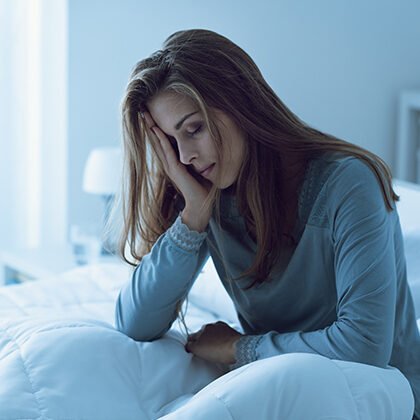
Insomnia
Learn the signs, symptoms, and treatment options for insomnia.
What is insomnia?
Insomnia is a sleep disorder where the affected individual struggles to fall or stay asleep. Insomnia can be a drain on day-to-day life as lack of sleep impacts mood, energy, along with physical and mental health.
There are two types of insomnia, acute and chronic. Insomnia is classified as acute when an individual struggles to fall asleep over a short timeframe. Typically acute insomnia is related to an event that has happened or other stressors. Acute insomnia often resolves itself after some time.
Chronic insomnia is persistent difficulty with sleeping that occurs longer than two months and may be a symptom of other medical conditions or the side effect of a medication.
What are the symptoms of insomnia?
Symptoms of insomnia include:
Difficulty falling and staying asleep
Waking up before an alarm (and not falling back asleep)
Persistent tiredness during the daytime
Irritability
Brain fog (difficulty remembering or paying attention)
Symptoms related to insomnia are fairly common and can be attributed to a variety of other medical conditions making it difficult for individuals to know they need help.

What causes insomnia?
Most commonly insomnia is caused by a change in an individual’s life. Interruptions to a typical sleep schedule, such as traveling for pleasure or work, can cause acute insomnia until a rhythm is found again. Larger stressors like the loss of a loved one, changes in jobs, or divorce may also play a role.
Certain medical conditions may also impact sleep. Sleep-related disorders like sleep apnea or restless leg syndrome may cause insomnia. Additionally, mental health disorders factor into an individual's ability to sleep. Depression often causes an individual to wake up too early. Other disorders like post-traumatic stress disorder (PTSD) may also play a role.
Medications can also have sleep side effects.
Lifestyle factors also cause insomnia. Consumption of drugs, alcohol, and nicotine may help individuals fall asleep initially, but they can greatly impact the quality of sleep. Lack of physical activity, eating too late at night, and improper nutrition are also factors.

How is insomnia diagnosed?
The first step toward an insomnia diagnosis is to work with a primary care doctor. They will listen to your symptoms and look for related conditions that may be causing insomnia. This is done through a variety of tests.
Providers will also try to establish a review of the individual's sleep habits. Since each person has different sleep requirements, it’s important for providers to understand the patient on an individual level. This review may take place over several days or months and patients are typically asked to keep records of their sleep habits for the provider to review.
A sleep study is performed when a provider cannot determine the direct cause. This may involve a stay at a sleep center or an at-home study. Often these studies are performed to determine if an individual has a sleep disorder such as sleep apnea or restless leg syndrome.
Schneck Sleep Medicine
Schneck is proud to offer sleep medicine services to help our patients find restful nights once again.

Emilee SurVance, DO
Sleep Medicine View Info »How is insomnia treated?
Acute insomnia will resolve itself over time. If difficulty sleeping persists longer than two months (chronic insomnia) there are a variety of treatment options available.
Sleep therapies
The preferred option for treating insomnia, therapies such as cognitive behavioral therapy (CBT-I) have been proven to treat insomnia by helping individuals control the anxious thoughts that are preventing sleep. Individuals learn to control these thoughts in a few ways including relaxation techniques, light therapy, paradoxical intention, stimulus control therapy, and sleep restriction. .
Prescription medications
Providers may prescribe medications if sleep therapies are not providing the correct response. However, they should not be relied on long-term and some specific medications are only prescribed for a few weeks of use. Prescription medications do come with side effects so it’s important for individuals taking them to work closely with their provider before taking them.
Lifestyle changes
Insomnia can be brought upon by lifestyle factors such as alcohol or drug use, lack of physical activity, and poor diet. If an individual is suffering from sleeplessness, a good first step would be to incorporate healthy lifestyle changes. This includes eating nutritionally balanced meals, getting outside and exercising, and reducing alcohol or caffeine intake.
Take the next step toward better sleep
Schneck Sleep Medicine center helps individuals understand what is causing their insomnia and find solutions that help them get back to better sleep. If you or a loved one is suffering from symptoms associated with insomnia, know that Schneck can help. Give us a call to get started.
